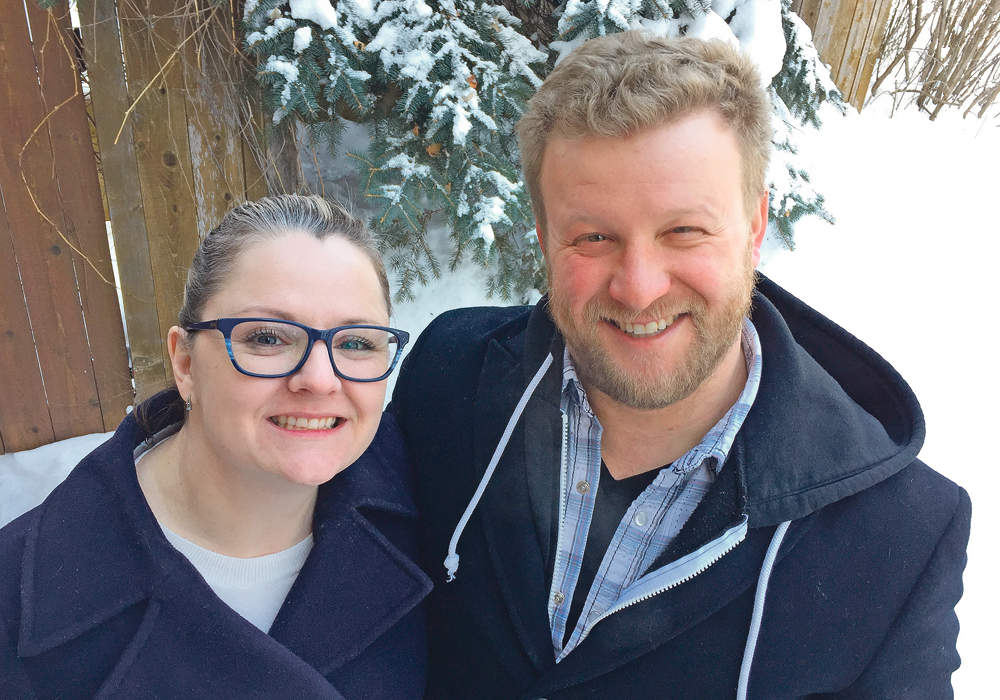A young farm couple from Manitoba didn’t plan the way they started farming together, but they’re focused now
Rauri Qually credits a bit of good luck for his successful courting of Pam Bailey.
She, a Nova Scotia native, had never been to a “social,” but had heard of the uniquely Manitoba phenomena. He, while buying a spare part at the outlet she worked at, offered to take her to one he was attending the next evening.
“I’m convinced that if she hadn’t won (the grand prize: a KitchenAid mixer), we wouldn’t be together today,” said Qually, recalling that time, a time before he was easing into farming, before he got his agriculture diploma, and before Bailey became a Manitoban.
Read Also

Accurate accounting, inventory records are important
Maintaining detailed accounting and inventory records is not just a best practice; it’s a critical component of financial health, operational efficiency and compliance with programs like AgriStability.
A lot of good luck played into the couple’s coming together, with Bailey having no intention of becoming a prairie person when she left the Maritimes.
“We were just going to go out, make money and go home (to the East Coast),” said Bailey.
Her “master plan” was “I don’t have kids, I don’t have a house, I don’t have big bills, so I’ll make a run out West like all the other east coasters, I’ll learn more about Canadian agriculture, I’ll make all of that big ‘out west’ money, and then I’ll come home.”
Bailey had studied horticulture at Dalhousie University and planned to work in a high-value, low-acreage form of agriculture. Until she had enough money and opportunity to do that, she worked at contract positions with a number of organizations, focusing on rural business development in agriculture.
Then she headed to Portage La Prairie with her friend, met Qually and the future changed.
He was working as an electrician in the Winnipeg area (their farm is about 30 kilometres west of the city) when he and his father began having serious discussions about Qually taking over the farm.
Qually decided he wanted to try to become a full-time farmer, if he could figure out how to do that on the 1,000 acres their family farm comprised, in an area where it is impossible to buy more land at prices a young farmer could afford.
He was fortunate that his brother, who works in Winnipeg, was keen for Qually to keep the farm in the family.
“Dad said, ‘you’d better go take the diploma program (at the University of Manitoba),’ and I said OK.”
So, with Bailey now in the picture, he headed off to the two-year course at the university in 2015. At the age of 29, he was almost a decade older than some of his classmates, but he loved the program, the friends he made there, and the foundation in farm management he developed in the highly regarded program.
He still works as an electrician, with his own business serving mostly local customers who appreciate his combination of electrician skills and farming knowledge.
Bailey still works on contracts for various organizations.
But both want to focus on farming, if they can solve the issue of how a young couple can get ahead in farming. Taking over the existing farm will take years and money. Additional land is exceptionally hard to either find or afford in Manitoba’s Red River Valley.
It’s a tough situation for young farmers these days, they know. But they don’t just complain about it on coffee row. Both have become heavily involved in farm organizations, where they play roles developing farm policy.
Bailey is the first female director in the history of the Manitoba Canola Growers Association, a position she got after talking to the organization’s president, who farms nearby.
“I said, ‘how come there are no women’ on the board of directors. He said, ‘because you haven’t applied yet,’ ” said Bailey.
Qually is a director with the Manitoba Wheat and Barley Growers Association.
The two serve on their local Keystone Agricultural Producers Association committee. Recently, they were able to present a resolution about helping young farmers to the KAP annual meeting, a resolution the two cooked up between themselves and then bounced off KAP’s young farmers’ association.
They have tried to channel their talents and energy toward constructive work like this, especially when they get frustrated by the challenges young farmers face.
“We can only sit through so many speakers (at conferences) saying the future is bright, but in every graph they show, it doesn’t look bright,” said Qually.
If practical solutions can be developed by young farmers like them, maybe the generational shift that’s going on across the Prairies can be less difficult to pull off.
“Hopefully, over time, maybe we can do something about that so we don’t have to work off-farm,” said Qually.
But the chance of that relies upon other young farmers getting involved like they have.
“Go to your local meetings. Get on your local board,” said Qually.
















